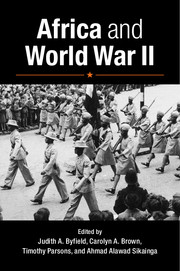Book contents
- Frontmatter
- Dedication
- Contents
- List of Contributors
- Acknowledgments
- Preface
- ONE INTRODUCTION
- TWO COLONIAL SUBJECTS AND IMPERIAL ARMIES
- THREE MOBILIZING COMMUNITIES AND RESOURCES FOR THE WAR EFFORT
- FOUR RACE, GENDER, AND SOCIAL CHANGE IN A TIME OF WAR
- FIVE EXPERIENCING WAR IN AFRICA AND EUROPE
- 19 American Missions in Wartime French West Africa: Travails of the Sudan Interior Mission in Niger
- 20 Fighting Fascism: Ethiopian Women Patriots 1935–1941
- 21 Defending the Lands of Their Ancestors: The African American Military Experience in Africa during World War II
- 22 French African Soldiers in German POW Camps, 1940–1945
- SIX WORLD WAR II AND ANTICOLONIALISM
- SEVEN CONCLUSION
- Index
21 - Defending the Lands of Their Ancestors: The African American Military Experience in Africa during World War II
from FIVE - EXPERIENCING WAR IN AFRICA AND EUROPE
Published online by Cambridge University Press: 05 May 2015
- Frontmatter
- Dedication
- Contents
- List of Contributors
- Acknowledgments
- Preface
- ONE INTRODUCTION
- TWO COLONIAL SUBJECTS AND IMPERIAL ARMIES
- THREE MOBILIZING COMMUNITIES AND RESOURCES FOR THE WAR EFFORT
- FOUR RACE, GENDER, AND SOCIAL CHANGE IN A TIME OF WAR
- FIVE EXPERIENCING WAR IN AFRICA AND EUROPE
- 19 American Missions in Wartime French West Africa: Travails of the Sudan Interior Mission in Niger
- 20 Fighting Fascism: Ethiopian Women Patriots 1935–1941
- 21 Defending the Lands of Their Ancestors: The African American Military Experience in Africa during World War II
- 22 French African Soldiers in German POW Camps, 1940–1945
- SIX WORLD WAR II AND ANTICOLONIALISM
- SEVEN CONCLUSION
- Index
Summary
In December 1942, as the outcome of World War II remained uncertain, African American newspapers across the United States focused on West Africa. A contingent of African American soldiers had landed in Liberia to establish an Allied presence in one of the continent's remaining two independent nations; Ethiopia was liberated on January 18, 1941. As the Pittsburgh Courier noted, the war had brought African American soldiers “back to the land of their ancestors … helping the new Allied partner maintain its freedom and keep out enemy invaders.” The soldiers arriving in Liberia were the first of tens of thousands of African American military personnel that served in over a dozen African countries during the war. African American soldiers, sailors, marines, and medical staff interacted with local peoples wherever they served, forming relationships that transcended the barriers of language and culture. These encounters left lasting marks on both African American veterans and Africans that would shape their postwar experiences in the decades ahead. While considerable scholarship has examined the African American contribution to World War II in other combat theatres, the African American military experience in Africa has received little scholarly attention. This chapter provides a preliminary examination of this topic and suggests avenues for future research.
African Americans have served in the U.S. armed forces since the nation's founding. Their sacrifices on the battlefield were means by which African Americans advanced the cause of racial equality, whether to end slavery during the American Civil War or to achieve simultaneous victories over Fascism and Jim Crow during World War II's “Double V” campaign. Jim Crow's malignant influence extended to the American military itself, with the nation's armed forces as segregated as American society. With few exceptions African Americans fought in segregated units, slept in separate barracks, ate in separate mess halls, and enjoyed leisure time in separate recreational facilities. The American Red Cross even separated African American blood into segregated blood banks.
- Type
- Chapter
- Information
- Africa and World War II , pp. 401 - 419Publisher: Cambridge University PressPrint publication year: 2015
- 1
- Cited by

